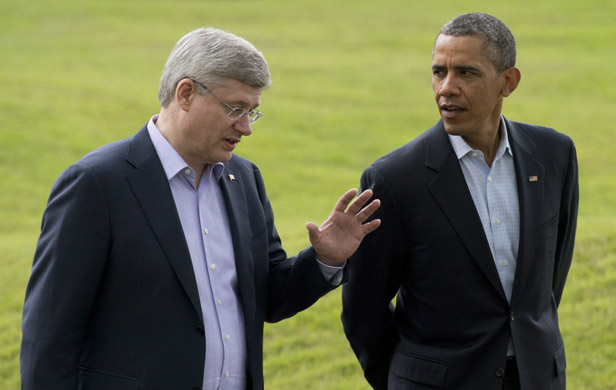
by Bruce Cheadle
OTTAWA – The Conservative government is spending $40 million this year to advertise Canada’s natural resource sector — principally oil and gas — at home and abroad.
Natural Resources Minister Joe Oliver revealed the figure Wednesday as his department seeks another $12.9 million to augment an international campaign designed to portray Canada as a stable and environmentally responsible source of energy.
That will bring NRCan’s 2013-14 ad budget to about $40 million — $24 million for advertising abroad and $16.5 million for the domestic market.
“The government has a responsibility to provide Canadians with facts to assist them in making informed decisions,” Oliver, under opposition questioning, told a Commons committee.
[quote]This engagement and outreach campaign will raise awareness in key international markets that Canada is an environmentally responsible and reliable supplier of natural resources.[/quote]
The entire federal government advertising budget last year was about $65 million, according to preliminary estimates, with $9 million allotted for Natural Resources.
In 2010-11, NRCan spent just $237,000 on advertising, according to the government figures.
Outside the committee room, Oliver justified the spending by linking it directly to winning over American public opinion in order to get approval of TransCanada’s controversial Keystone XL pipeline. The $5.4-billion project to carry Alberta bitumen to the Gulf Coast has become a lightning rod for environmental activists as it awaits a decision from U.S. President Barack Obama. Said Oliver:
[quote]Let’s understand what is at stake here,” Oliver said. “When we’re looking at Keystone, for example, we’re talking about tens of thousands of jobs.[/quote]
Asked to justify ad spending for one industrial sector that’s swallowing up almost two thirds of last year’s total government ad budget, Oliver was emphatic: “You justify it by what it’s going to achieve and there are billions, tens of billions of dollars, in play.”
Peter Julian, the NDP natural resources critic who teased out the ad spending at the committee, isn’t buying the government rationale.
“I don’t see how the Harper government can justify spending tens of millions of taxpayers’ money to do something that the private sector could choose to do,” Julian said after the hearing.
The New Democrat said the ads won’t work because the Conservatives, through their policy choices, have “killed the possibility of social licence” — getting public buy-in, essentially — for major resource projects.
He said that by slashing environmental assessments and limiting “meaningful public consultation” on pipeline proposals, the government has sparked a public backlash.
The backlash, Julian asserted, is “worldwide. Canada has a black eye. There’s no doubt.”
He cited the Obama administration, which has openly urged Canada to up its environmental game, and the European Union, which is targeting higher emissions from oilsands production.
Rather than millions on ads, said Julian, “the way the Harper government can start to gain back the social licence is by starting to make better decisions on the environment, on the economy and on the whole process of approving these new projects.”
To that end, the government is making an effort to establish a baseline of research on cutting edge oilsands technology.
Natural Resources has asked a panel of experts to help catalogue and chart a way forward for technologies that can help reduce the environmental footprint of oilsands development.
Oliver has asked the Council of Canadian Academies to turn its gaze on new and emerging technologies for extracting bitumen from Alberta’s oilsands.
A 13-member panel will study what’s currently working and has been asked to identify economic and regulatory hurdles that slow the spread of the most promising technologies.
“There’s a lot of rhetoric, there’s a lot of exaggeration,” Oliver said of the study.
[quote]People can come to different conclusions based on the facts, but let’s start all together. We should all start with the facts.[/quote]
The council was created in 2005 with a 10-year, $30-million government grant and is designed to provide peer-reviewed, science-based assessments to help inform public policy.
Canada is not on track to reach its international pledges for reducing greenhouse gas emissions by the year 2020, but the Conservative government has frequently held out hope that technological breakthroughs will alter that trajectory.
A spokeswoman for the academy, a not-for-profit corporation, says expert panels typically take between 18 and 24 months to report and do not make policy recommendations — but instead provide a base of solid evidence to use in the policy mix.
The panel is to be co-chaired by Eric Newell, the former CEO of Syncrude Canada, and by the head of the International Institute for Sustainable Development, Scott Vaughan.


$40 m of hard working Canadian’s money spend to tell Canadian’s and the world that Canada no longer cares about clean air to breath, safe water to drink and devistating climate events.
A message from our CEO Steven Harper
Canada Inc.
I have seen these commercials and they are such a farce. Green beautiful landscapes surrounded by wildlife. Areas previously mined now revitalized and full of trees and nature. All clean! Not. Have you ever driven in Northern Alberta? (I have). The actual conditions in and around the tar sands are a toxic, grey, uninhabitable wasteland.
Ought to spend that money actually cleaning up the blinkin tar sands. The left MUST unite to oust this megalomaniacal idiot.
The little despot couldn’t even clean up his own image with the $40M
This is what you call the responsible use of Canadian Taxpayers dollars? Advertising for a group of foreign multi national oil corporations?
If this advertising ended up in more Canadians getting jobs, I would say fill your boots. But it doesn’t.
Pumping it out to other countries at $35 a barrel, for them to refine it, and sell it back to us at $108 a barrel, only creates work overseas.
The green house gas nightmare aside, we as tax payers are left with the clean-up and remediation costs after these foreign corporations walk away. Why? because this government is not asking them to actually re-mediate all of the pipelines criss crossing the country.
We have to stop thinking oil as a source of energy and start thinking progressively as we can see Europe and particularly the Scandinavian country are doing. Time to get off oil.
Furthermore, Canadian politicians at all levels have to stop being manipulated by foreign corporations. New lobbying laws are needed to provide an equal voice for Canadians.
Spending money to attempt to look good, while destroying life, damaging the Earth, and contributing to global climate change; Mr. Harper once again demonstrates that he is a sociopath.